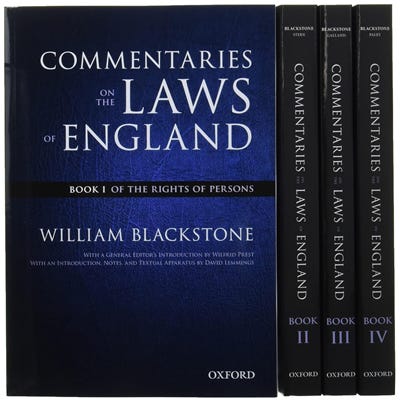The Oxford 2016 first edition of Blackstone's: commentaries on the laws of England.
"The definitive version of this classic text of Anglo-American law. Detailed varia trace the evolution of Blackstone's thought through the first nine editions. An editorial introduction by Ruth Paley details the historical and political context of Blackstone's views on the criminal law. Descriptive notes assist the modern reader in understanding the text, and the pagination of the first edition has been retained for easy cross-referencing. Entirely re-typeset with modern fonts and apparatus."
Blackstone, W. (2016). The Oxford Edition of Blackstone’s Commentaries on the Laws of England: Book I, II, III, and IV (R. Paley, Ed.). Oxford University Press.
Links:
1. Oxford University Press: https://global.oup.com/academic/product/the-oxford-edition-of-blackstones-9780199600984
2. Internet Archive: Oxford's 1775 sixth edition of Blackstone's commentaries.
"Sir William Blackstone (10 July 1723 – 14 February 1780) was an English jurist, justice and Tory politician most noted for his Commentaries on the Laws of England, which became the best-known description of the doctrines of the English common law."
"The Commentaries on the Laws of England (i.e. Blackstone's Commentaries) are an influential 18th-century treatise on the common law of England by Sir William Blackstone, originally published by the Clarendon Press at Oxford between 1765 and 1769. The work is divided into four volumes, on the rights of persons, the rights of things, of private wrongs and of public wrongs.
The Commentaries were long regarded as the leading work on the development of English law and played a role in the development of the American legal system. They were in fact the first methodical treatise on the common law suitable for a lay readership since at least the Middle Ages. The common law of England has relied on precedent more than statute and codifications and has been far less amenable than the civil law, developed from the Roman law, to the needs of a treatise. The Commentaries were influential largely because they were in fact readable, and because they met a need. As such, they were used in the training of American and British lawyers long after the death of Blackstone.
The Commentaries are often quoted as the definitive pre-Revolutionary source of common law by United States courts. Opinions of the Supreme Court of the United States quote from Blackstone's work whenever they wish to engage in historical discussion that goes back that far, or farther (for example, when discussing the intent of the Framers of the Constitution)."
Source: Wikipedia contributors. (2025, January 20). Commentaries on the Laws of England. In Wikipedia, The Free Encyclopedia. Retrieved January 31, 2025, from https://en.wikipedia.org/w/index.php?title=Commentaries_on_the_Laws_of_England&oldid=1270624075
Source: Wikipedia contributors. (2024, October 19). William Blackstone. In Wikipedia, The Free Encyclopedia. Retrieved January 31, 2025, from https://en.wikipedia.org/w/index.php?title=William_Blackstone&oldid=1251965026


